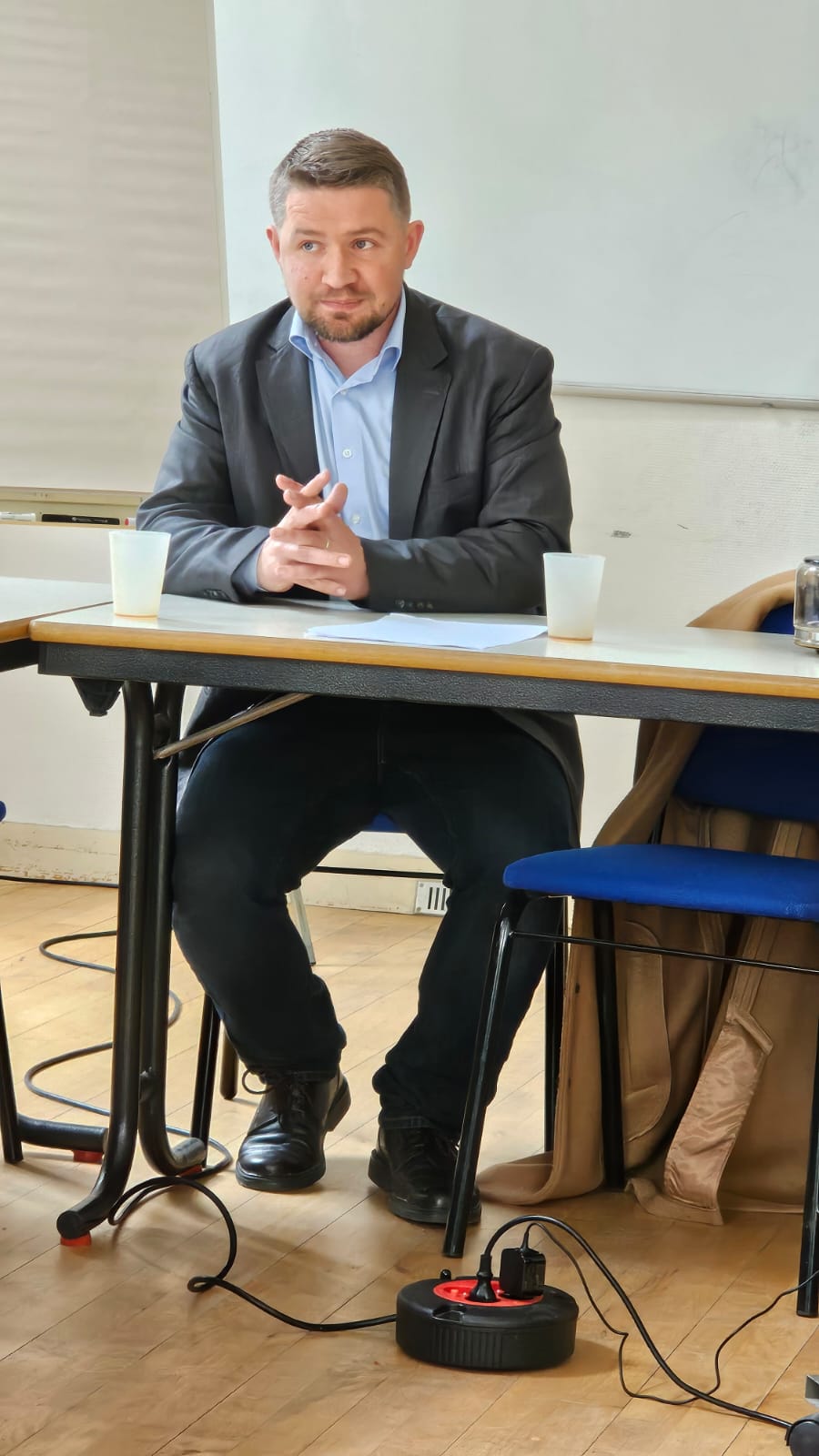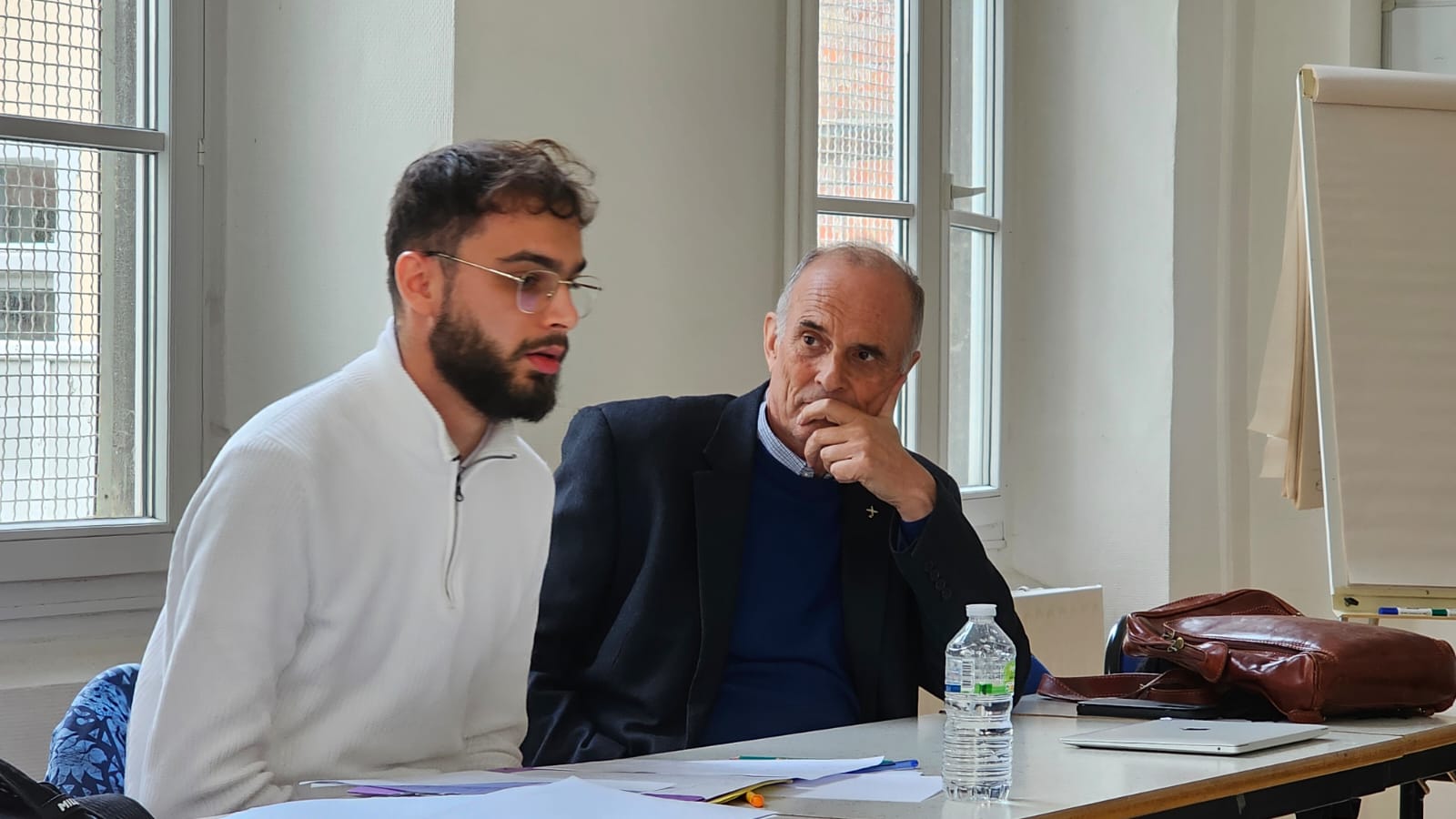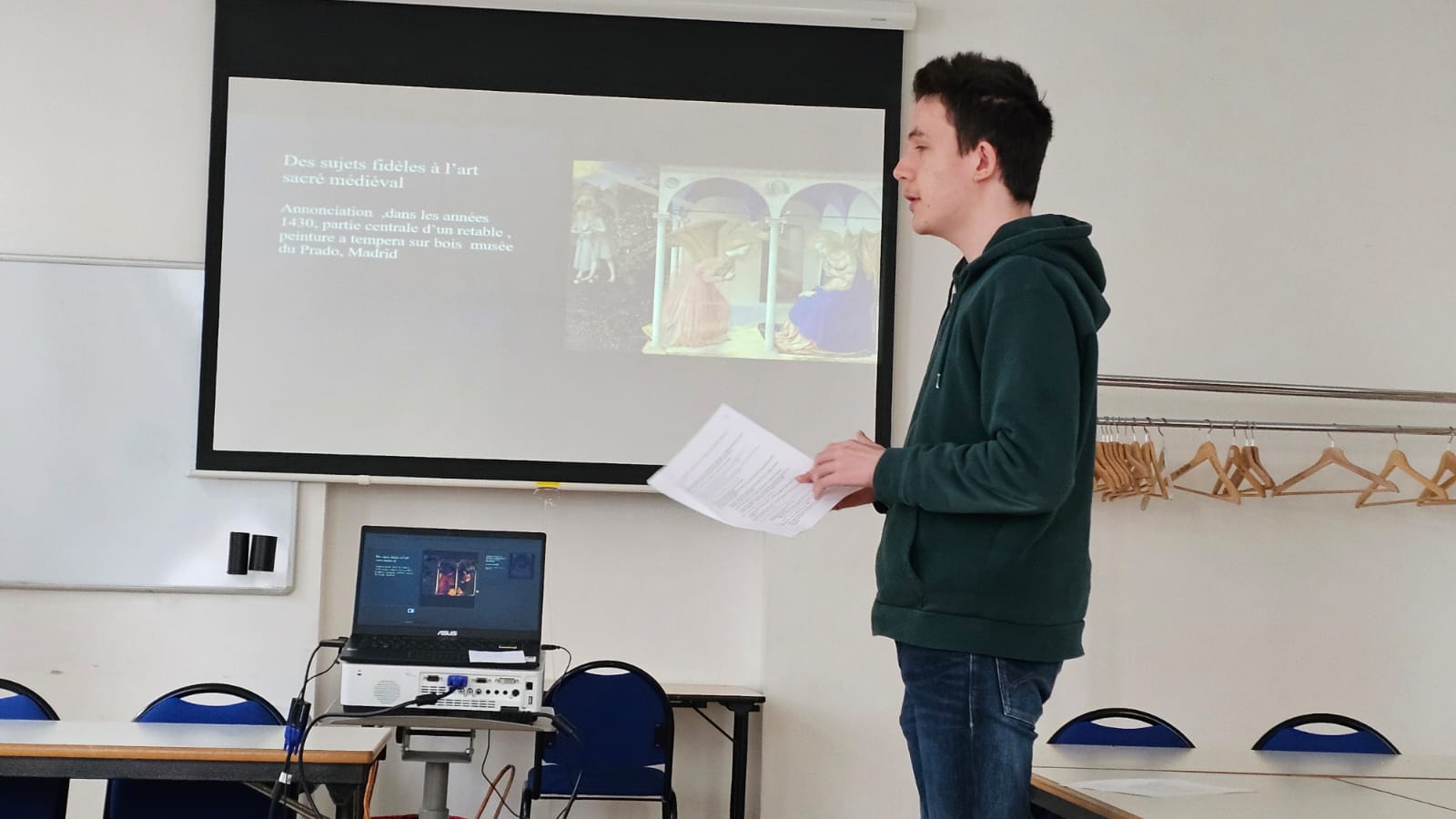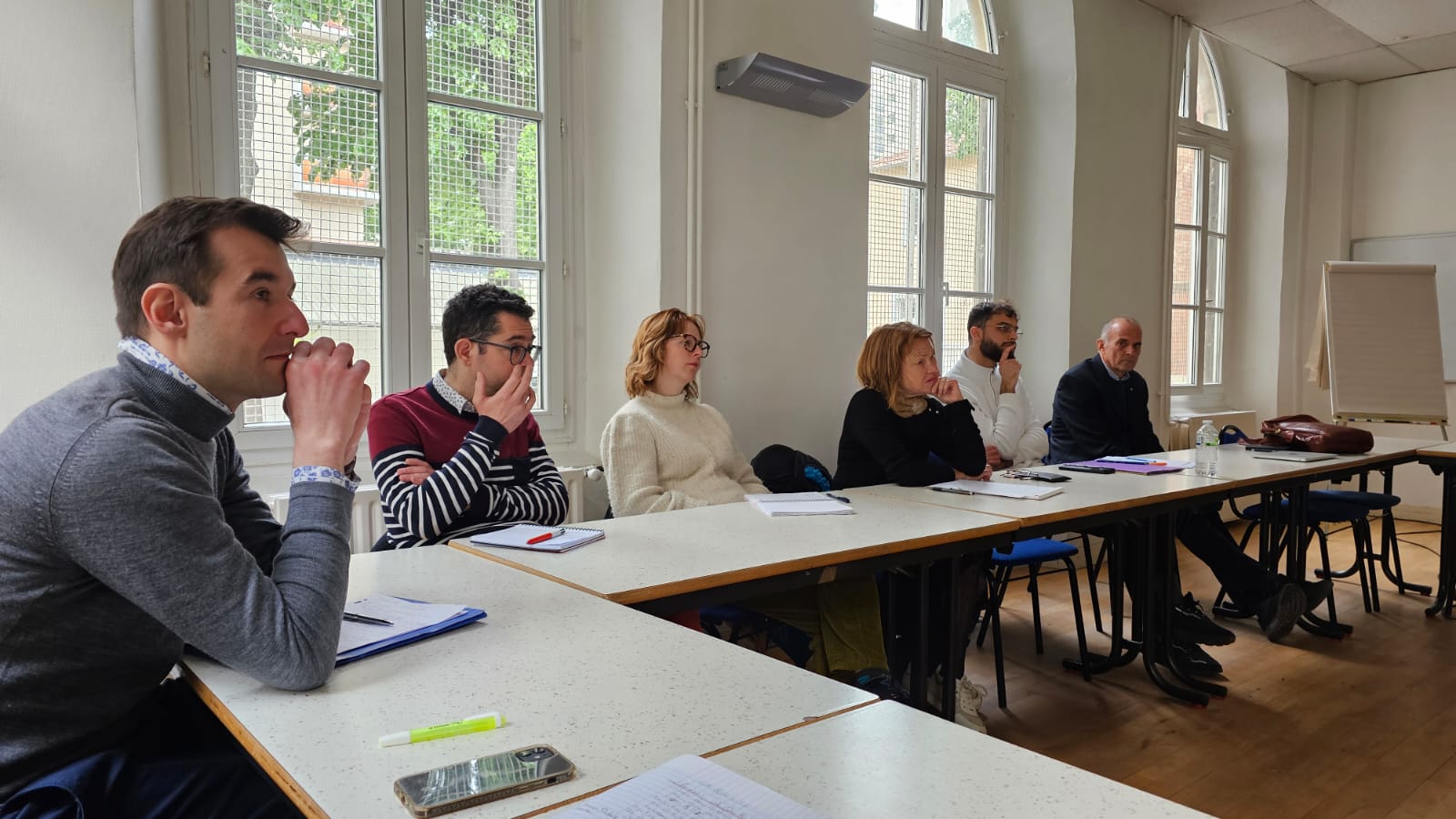News
Meeting between students and teachers
2 may 2024
GETTING TOGETHER "FOR REAL"
They are converging towards Lyon on this sunny April morning, a brief ray of light in the middle of a rainy spring. "They" are students who are studying remotely, at Domuni-Universitas, the Dominicans' online university, founded over twenty-five years ago, at the earliest days of the internet.
They meet in a brightly-walled room in the Friars Preachers' cultural center next to the convent, a few hundred meters from the Parc de la Tête d'Or. The faces are friendly, even if for some the night has been short. Some of them have come from far away, from Annecy, Chambéry and even Paris, Angers and Hardelot. "Because it's worth it", they say.
THE ONLINE DISTANCE LEARNING EXPERIENCE
Today, it's commonplace to take courses online. A commonplace? Not quite, judging by the experience they are sharing. After brief introductions, at the invitation of the Rector who was present that morning, each of them took the opportunity to talk about their experiences and what distance learning has brought them, with its share of discoveries and difficulties. "Domuni was founded for you and grows with you", explains Marie Monnet, "at the service of those who can't study any other way". The majority of our students are in their thirties, with a strong commitment to their professional and family lives.
A WORD FROM OUR STUDENTS
Nicolas, 33, is married with three children, and a layman on a pastoral mission after a military career. As he says, he's "doing things the other way round", taking a distance learning Bachelor's degree in philosophy to complement the theology courses he previously took in a face-to-face faculty. He would like to go on to a Master's degree in philosophy, and perhaps one day be able to teach this discipline in high school.
Thomas, a computer engineer and recently converted, typed "theology" into Google and found himself at Domuni, in the first year of a theology degree.
Camille, 19, from the Lyon region, enrolled for a bachelor's degree in art history and brilliantly presented a research paper on the painting of Fra Angelico. "I've forgotten all about catechism, but I'm now passionate about it and I'd like to become a cultural mediator in the future".
Chantal is an anesthetist and pain specialist. On this particular morning, she rubs shoulders with a colleague she didn't know before, Marie-Christine, a pediatric oncologist. I wanted to go further in patient care," she explains, "so I started studying Husserl in depth, and then plunged into a Master's degree in philosophy.

She makes no secret of the fact that there are "big chunks" to swallow, encouraging another philosophy student struggling with the metaphysics course. "It's a great course", they both say, but "very difficult". "And you're not done yet," she concludes mischievously. "You'll see, there are other big chunks behind it, but that's worth it too". This language and familiarity are a welcome relief in the midst of sometimes arid studies.
Isabelle works for the Office of the High Commissioner for Refugees in Geneva, after several years in the field in Africa. Converted a few years ago, she says she wanted to "discover the pillars of Christian anthropology". She is taking a certificate in theology at Domuni, enabling her to delve deeper into these notions at her own pace.
Julien came with her, "as a friend" and "to find out more", as he also plans to continue his studies at a distance, combining this with his job as an accountant in the Catholic education system.
Bastien has recently returned from abroad, where he was an expatriate working as an actuary. Moving closer to France, he is pursuing his studies at Domuni, which began outside France. The flexibility of studies is at the heart of these testimonials.
THINKING TOGETHER, AROUND A THEMATIC THAT MAKES SENSE
In Lyon, on this spring Saturday, experiences are converging, along with knowledge and learning. A theme has been chosen: what is fidelity? How do we think about the 'temps long'? And the question, massive and impressive, will be debated, based on the participants' presentations, at the crossroads of several disciplines and several methodologies.
This is the aim of these participatory study days: to enable those who can to meet regularly with other students and teachers. For the latter, too, the encounter is fruitful.
WITH MENTORS AND TUTORS
It allows us to "put faces to the people we support on a daily basis". According to Emmanuel Boissieu, a mentor at Domuni's Faculty of Philosophy. This Saturday, he met some of "his" students for the first time. There's even a touch of emotion, as we already know each other, but in a different way. Students talk about how patient and attentive he is. Personalized support is at the heart of Domuni's distance learning pedagogical system.
The study days strengthen existing links, and in small groups, they enable students to feel even more connected to each other. "We meet people who have the same interests as we do", and that's not so common in today's world. "I feel more connected to the community," says one participant at the end of the meeting. It's this sense of belonging that the participative study day reinforces.
STRENGTHENING TIES

"We already know each other", they all admit, but "it strengthens the bonds to see each other"! The Rector confides: "At Domuni, it's the mystery of human relationships, of being present to oneself and to others, from a distance, that always invites us to meet, at one time or another. You come away from the study days with something of a different kind, a form of friendship perhaps, the conviction that you are not alone on your journey, which for most of us is an existential quest". The aim of these days is truly participatory, as the name suggests. It's not the umpteenth lecture given by someone who knows, listened to by those who don't know.
A STRUCTURING STUDY
At Domuni, study is intended to provide structure. "During their studies, students receive an immense intellectual heritage", says the Dominican Michel Van Aerde, honorary rector and professor, who was present on Saturday. "We try to pass on strong references, points of support in space and time". Theology, philosophy, history and art history are all disciplines that lend themselves to this.
"But without forgetting what is essential: that these strong references are assimilated, that they become one's own, so that they can enter into discussion with contemporary issues, with everything that questions our loved ones, our societies, our communities". He adds: "In the Order of Preachers, founded in the 13th century to discuss with the Cathars, there is this mission of confronting others, and this is learned. Through Domuni's teaching methods, which are fully in line with this history, we are also trying to teach students this". From beneficiaries, they must become players in their training and perhaps in turn, players in the training of others...
INTELLIGENCE IS COLLECTIVE

The word "participate" is therefore not insignificant for participatory study days, such as the one in Lyon on Saturday. In the words of one of the teachers present, it means "for everyone, taking part in the issues, getting involved and contributing to the common reflection". Camille gave a particularly coherent presentation on Fra Angelico, and prompted the other participants to think about the issue: "Is the artist's creativity a break with fidelity? Claire, a professor of contemporary history, asked about loyalty to General De Gaulle, and provided food for thought by tracing the birth of the Compagnons de la Libération, from the appeal of 18 June 1940 to the General's death in 1970. As a philosopher, Marie-Christine led the group to consider the notion of "self-loyalty". Is it incompatible at certain times with the loyalty promised to others? In other words, how should we think about temporality? We turn to Heidegger for inspiration.
Each contribution is intended to be brief, lively and even provocative. Everyone, from their own discipline, gets involved and takes an active part, engaging in the process of reflection and debate. It's a game of collective intelligence, like a small stage production in a given time and place. Around a question, a concept, an idea, everyone lends themselves to it, and puts into practice the capacity of the group formed that day to collaborate and innovate by combining knowledge, skills and experience.
The day quickly drew to a close, a photo was taken in the cloister of the Dominicans, and emails and telephone calls were exchanged. We all know that we'll be back on the Domuni platform the next day, linked up and ready to continue our journey together.


